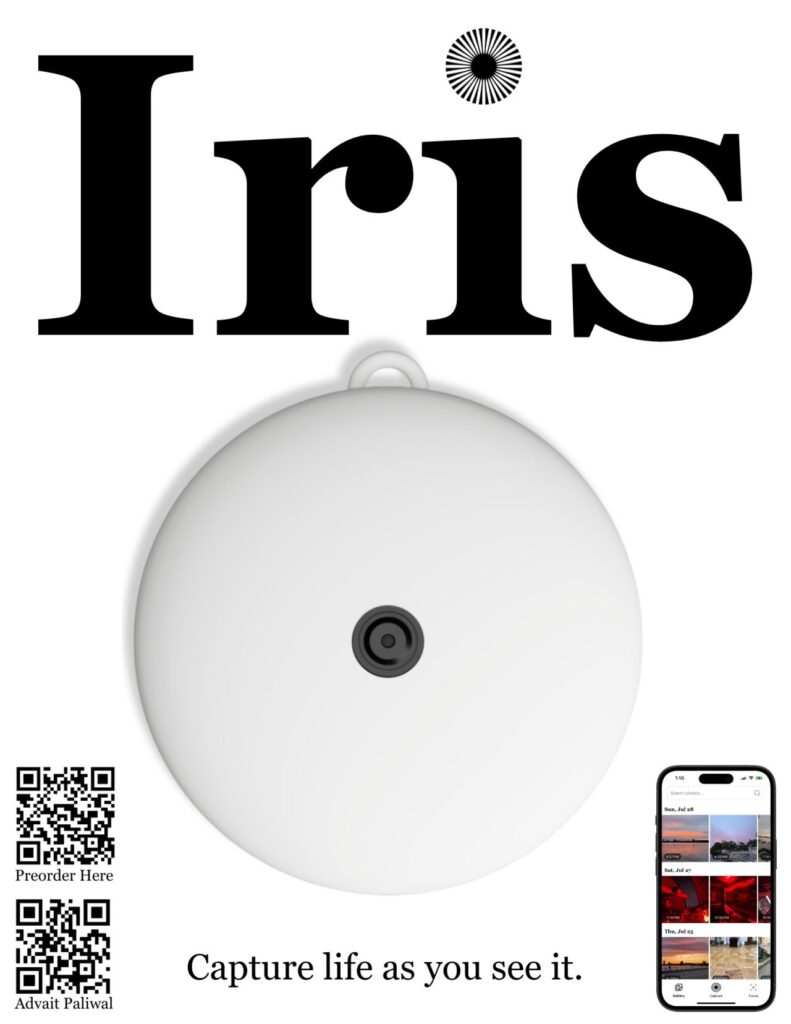![]()
Indian-origin tech visionary, Advait Paliwal, has recently announced the launch of Iris, a wearable AI device designed to provide users with “infinite memory.” This groundbreaking invention not only captures every moment of the user’s life but also helps them stay focused on essential tasks, making it a unique blend of memory enhancement and productivity management.
The Genesis of Iris

Advait Paliwal, a Master of Science graduate from Brown University, a renowned Ivy League institution, revealed Iris on social media, showcasing its distinctive features. The wearable AI device, designed like an evil-eye necklace, was developed during his two-month stint at Augmentation Lab, a transdisciplinary research and development lab in Cambridge. During this time, Paliwal participated in an AI and hardware talent accelerator program, which served as the foundation for the creation of Iris.
What Makes Iris Special?
The Iris device is designed to capture life as users experience it. By combining AI capabilities with wearable technology, Iris offers three primary functions that set it apart from traditional devices:
- Automatic Image Capture: The device takes a picture every minute, recording key moments throughout the day.
- Organized Timeline: Using AI, Iris captions and organizes these photos into a comprehensive timeline, making it easier for users to recall specific moments.
- Memory Aid: Iris uses AI-driven algorithms to help users remember forgotten details, providing a significant advantage for individuals facing memory challenges.
Additionally, Iris features a Focus Mode, designed to combat distractions. When the device detects that a user is getting distracted, it gently reminds them to refocus on their tasks, helping improve productivity and attention span.
A Vision for the Future
Paliwal’s announcement didn’t just stop at the technical capabilities. He expressed his gratitude to Professor Pattie Maes, a leading figure in cognitive augmentation at MIT Media Lab, for inspiring his work. Sharing a photo of himself wearing Iris as a necklace, Paliwal highlighted how the device has been well-received by over 250 individuals during his presentation at MIT Media Lab.
Potential Benefits and Use Cases
Beyond personal productivity, Iris holds promise for broader societal applications. Paliwal outlined several areas where Iris could make a meaningful impact:
- Healthcare: Iris could help doctors monitor patients’ daily habits and routines, allowing for better diagnosis and treatment plans.
- Elderly Care: For caregivers, especially in elderly care settings, Iris offers a non-intrusive way to keep an eye on patients, ensuring their safety without constant physical presence.
- Workplace Safety: Iris can be leveraged to ensure compliance with safety protocols in high-risk work environments, enhancing overall workplace safety.
Privacy Concerns and User Responsibility
While the benefits of Iris are clear, Paliwal acknowledged the potential privacy concerns associated with a device that constantly captures images and stores data. The device stores data locally on an SD card but also backs up every detail in the Cloud, raising questions about data security and misuse.
Paliwal emphasized that users must remain vigilant and responsible in how they use Iris. “There are good and bad sides to this. On one hand, Iris could really help people with memory problems or help us stay focused on our goals. But it also raises concerns about privacy and how these recordings might be used,” he noted.
Despite these concerns, Paliwal is confident that the decision to use Iris, and how to use it, ultimately lies in the hands of the users. By being transparent about the potential risks and rewards, he hopes that Iris can strike the right balance between enhancing lives and protecting privacy.
Conclusion
Advait Paliwal’s Iris represents a fascinating leap in wearable AI technology, offering users the ability to capture, remember, and refocus in ways never seen before. With promising applications in healthcare, elderly care, and workplace safety, Iris is more than just a personal gadget; it’s a tool that could shape the future of human-machine interaction. However, as with all new technologies, the success of Iris will depend on how well it balances innovation with ethical concerns around privacy.
FAQ: Iris Wearable AI Device
1. What is the Iris wearable device?
Iris is a revolutionary wearable AI device created by Indian techie Advait Paliwal, designed to capture moments of your life every minute and organize them into a comprehensive timeline.
2. How does Iris work?
Iris takes a picture every minute, captions the images, and organizes them into a timeline. It also uses AI to help users remember forgotten details and has a focus mode to alert users when they get distracted.
3. What are the main features of Iris?
- Automatic Image Capture: Takes a photo every minute.
- Timeline Organization: Captions and organizes pictures into a timeline.
- Memory Aid: Uses AI to assist users in recalling forgotten details.
- Focus Mode: Notifies users when they become distracted.
4. Where is the data stored?
Iris stores data locally on an SD card and backs up every detail in the Cloud for easy access and security.
5. Who can benefit from using Iris?
Iris is designed for anyone looking to enhance their memory and productivity, particularly those with memory challenges. It also has applications in healthcare, elderly care, and workplace safety compliance.
6. Are there privacy concerns associated with Iris?
Yes, there are potential privacy concerns related to constant image capture and data storage. Users are encouraged to use the device responsibly and be mindful of their privacy settings.
7. How can I get Iris?
Details on purchasing Iris will be provided by Advait Paliwal in upcoming announcements. Stay tuned for more information!
Reference Note for the Article:
This article used information from Advait Paliwal’s LinkedIn profile as a reference: Advait Paliwal’s LinkedIn.
